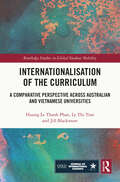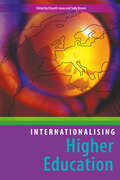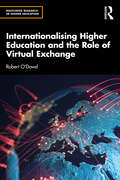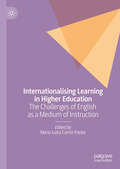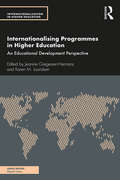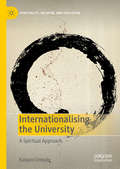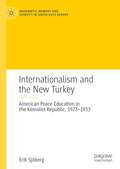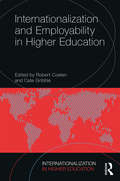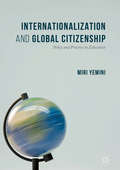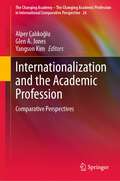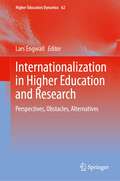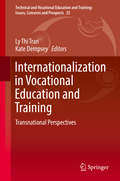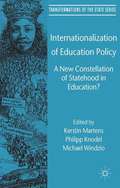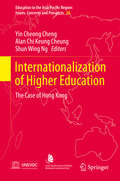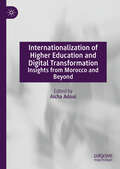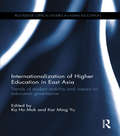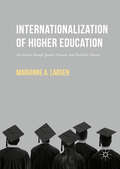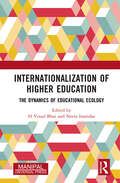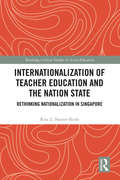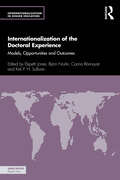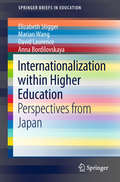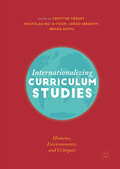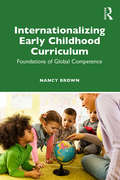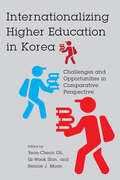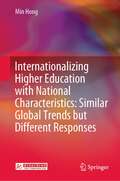- Table View
- List View
Internationalisation of the Curriculum: A Comparative Perspective across Australian and Vietnamese Universities (Routledge Studies in Global Student Mobility)
by Ly Thi Tran Jill Blackmore Huong Le Thanh PhanThis book compares the nature and practice of internationalisation of the curriculum at the policy, institutional, and classroom levels in Vietnam and Australia: the former an Asian, developing, and sending country of international students, and the latter an Anglophone, developed country, and a major education export provider.By examining curriculum internationalisation practices in these two vastly different socio-cultural contexts, the book contributes to the understanding of the magnitude and the range of differences regarding national and institutional responses to the common call for curriculum internationalisation. It addresses the impacts of the latest technological, political, economic, and sociocultural developments and COVID-19 on higher education internationalisation, as well as the digitalisation of international education. Crucially, it responds to a critical gap in the literature by not only investigating curriculum internationalisation policies and their implementation, but how faculty staff and students experience and engage with internationalisation of the curriculum in their home context, and how they position themselves and are positioned by the structural conditions with regard to curriculum internationalisation. The authors utilise document analysis, in-depth interviews, and focus groups from a four-year research project. The research employs a unique conceptual framework combining practice architectures theory and Barnett and Coate’s conceptualisation of curriculum as knowing-acting-being.Providing rich inputs for new ways of thinking and doing to enhance educational quality and the learning experiences of all students, the book is a valuable resource for researchers, academic staff, practitioners, leaders, and students in higher education and international and comparative education.
Internationalising Higher Education
by Sally Brown Elspeth JonesWith increasing numbers of international students, this book explores how best to broaden the approaches to learning and teaching in the higher/further education environment. Rather than seeing internationalization as a problem to be addressed, this text embraces the opportunities for the enrichment of the learning environment through a values-driven approach to internationalization. Taking a positive and practical approach to internationalizing higher education, the book considers a range of questions about how to bring in global perspectives to the learning environment and education provision. Packed with case studies and vignettes from around the globe, the book proposes that the international student lies at the heart of the university as a source of cultural capital and intentional diversity, enriching the learning experience, enhancing staff experience and building a more powerful learning community.
Internationalising Higher Education and the Role of Virtual Exchange (Routledge Research in Higher Education)
by Robert O'DowdThis volume introduces Virtual Exchange (VE) as an innovative form of online intercultural learning and investigates the myriad of ways VE is being carried out across universities, ultimately arguing for its integration into university internationalisation policies and course curricula. Against the backdrop of increased digitalisation initiatives throughout universities given the effects of the pandemic, chapters focus not only on providing new research findings, but also on providing a comprehensive introduction and argumentation for the use of VE in university education and also in demonstrating how it can be put into use by both university decision-makers and educators. Reviewing the limitations of the activity, this timely work also fundamentally posits how VE and blended mobility more broadly could be developed in future higher education initiatives. This book will be of interest to researchers, academics, scholars, and students involved with Open & Distance Education and eLearning, approaches to internationalisation in education, and the study of higher education more broadly. Those interested in innovative methods for teaching and learning, as well as educational research, will also benefit from this volume.
Internationalising Learning in Higher Education: The Challenges of English as a Medium of Instruction
by María Luisa Carrió-PastorThis edited book examines the use of English as a Medium of Instruction (EMI) in a variety of international higher education contexts. The internationalization of education – indicated by increasing mobility of students, staff and ideas, as well as by policies and programmes put in place to facilitate educational exchange - has led to increasing adoption of English as a Lingua Franca (ELF) for educational purposes. In this book, the authors present the results of empirical research into the implementation, assessment, development and use of EMI programmes in different settings, presenting the case for more structured training of teachers and staff. It will be of interest to second/foreign language teaching and administrative staff, as well as anyone else involved in teaching in English at higher education level.
Internationalising Programmes in Higher Education: An Educational Development Perspective (Internationalization in Higher Education Series)
by Jeanine Gregersen-HermansThis book addresses challenges that higher education institutions face when bridging the gap between internationalisation as a key university strategy and their delivery of interculturally competent and responsible graduates. Combining international case studies and research outcomes, it provides an in-depth understanding of the role educational developers can play in the internationalisation of higher education and in the provision of an internationalised learning experience for all students. The book situates international education in global and local contexts and contributes to the design and delivery of internationalised curricula in very concrete terms. In doing so, it suggests how academic staff may enhance the quality of their programmes by leveraging the opportunities of international classrooms where students have diverse academic, linguistic, and cultural backgrounds. The content of the book is therefore also foundational for continuing professional development (CPD) programmes that enhance staff competences for designing and teaching inclusive internationalised programmes and include topics such as: An international competence profile for educational developers Intercultural competence as a graduate attribute Internationalised curriculum design and delivery Intercultural group dynamics The role of languages in internationalised higher education classrooms Reflective processes for teaching and learning in the international classroom This book is essential reading and a go-to resource for any academic looking to internationalise their education programmes. It will also be of interest to those directly involved in curriculum development, learning, and teaching as well as those who have more strategic responsibilities within and beyond HEIs, or who are involved in higher education research.
Internationalising the University: A Spiritual Approach (Spirituality, Religion, and Education)
by Kalyani UnkuleThis book takes a critical look at the internationalisation of higher education and argues for the importance of grounding education in spiritual perspectives. Using spiritual traditions to review the practices, programmes, and philosophies of learning that internationalise universities, the author proposes a paradigm for internationalisation that respects other ways of knowing. This focus seeks to decolonize knowledge and promote intercultural understanding, as well as help students achieve holistic personal development while studying abroad.
Internationalism and the New Turkey: American Peace Education in the Kemalist Republic, 1923-1933 (Modernity, Memory and Identity in South-East Europe)
by Erik SjöbergThis book examines international education in Turkey after World War I. In this period, a movement for peace and international education among American educators emerged. This effort, however, had to be reconciled with the nationalist projects of new nation-states emerging from the war. In the case of the Near East that meant coming to terms with the radically nationalist modernization project of Kemal Atatürk’s Turkish Republic. Using the case of Robert College, an American educational institution in Istanbul, which aimed to foster a future local elite of a multi-ethnic and multi-religious student body, the book sheds light on the negotiation between two conceptions of modernity, as represented by American internationalist ideals and the tenets of Kemalism the Westernizing, yet deeply ethnocentric national ideology of post-1923 Turkey. Based on recently declassified archival sources, this study addresses the educational intentions and strategies for adjustment of college faculty. It also offers a rare insight into the mindset of young students attempting to make sense of what internationalism and religious, ethnic and national identity meant in the Ottoman past and in the new republican Turkey. Focusing on Robert College and the forgotten case of its dean and social studies instructor, Dr. Edgar Jacob Fisher, it addresses the little-researched field of internationalism and peace education in interwar Turkey.
Internationalization and Employability in Higher Education (Internationalization in Higher Education Series)
by Robert Coelen Cate GribbleProviding an analysis of the relationship between Internationalization and Employability in Higher Education, this book considers the perspectives of both students and employers to illustrate how to reach positive employment outcomes for all stakeholders. Through a wide range of international case studies, this book delivers some key messages, including: The articulation of the link between internationalization and employability; The need for higher education institutions to communicate the benefits of an internationalized higher education beyond the academy; The need to ensure equity of graduate outcomes through enhanced internationalization at home; The impact of immigration policy on national benefits of internationalization of higher education; International study as a route to employability for migration purposes and building knowledge-based economies. Considering the skills developed by students through mobility experiences, while exploring the need for enhanced internationalization of the curriculum at home, Internationalization and Employability in Higher Education will be a key resource for any higher education policy makers or university staff associated with careers, employment, and integrated learning. It contains important messages for employers and recruiters.
Internationalization and Global Citizenship
by Miri YeminiThis book examines the integration of the international, global, and intercultural dimensions in contemporary education systems. Yemini provides a comprehensive understanding of the process of internationalization from different angles including policy-making, curriculum implementation, media discourse, and individual agency. The book illuminates and analyzes a set of key tensions of internationalization across multiple levels of schooling and across the domains of popular discourse, policy, curriculum, pedagogy, and students' identity, by connecting or re-connecting the process of internationalization and its outcomes at individual level of global citizenship. The author uses solid empirical embedding of each of those aspects together with development of novel theoretical insights in each of the investigated domains.
Internationalization and the Academic Profession: Comparative Perspectives (The Changing Academy – The Changing Academic Profession in International Comparative Perspective #24)
by Glen A. Jones Alper Çalıkoğlu Yangson KimThis book makes a major contribution to the scholarship on internationalization in higher education by focusing on the perceptions and experiences of the academic profession in a comparative perspective. Drawing from data collected by the Academic Professions in the Knowledge-based Society (APIKS) project, the contributors to this volume are uniquely positioned to explore the impact and implications of internationalization on those who play the central role in the teaching and research functions of higher education: the professoriate. The core chapters address issues such as the roles of gender, discipline, and career stage in the international activities of academics in different countries, national differences in the perceptions and behaviors of university faculty in the internationalization of teaching, and of research within higher education systems on the perceptions and behaviors of academics. Each of these chapters draw on the existing research literature in these thematic areas as a foundation for the systematic analysis of the international APIKS dataset to illuminate and discuss key findings. This book offers a highly original and unique contribution to the study of internationalization in higher education because its editors and contributors, as participants in the APIKS project, have been able to raise and address key research questions using comparative international empirical data on the academic profession that has never before been available. Given the tremendous importance of internationalization and the global dimension of higher education, this volume offers unique, distinctive insights on the implications of internationalization for the academic profession and the very different ways in which these transformations are understood by academics both within and between systems.
Internationalization in Higher Education and Research: Perspectives, Obstacles, Alternatives (Higher Education Dynamics #62)
by Lars EngwallThis book examines the pros and cons of the internationalization of higher education institutions, which is an important feature of modern universities. It makes a significant contribution to our understanding of universities and an important input to the assessment of the internationalization of higher education institutions both for regulators and for the universities themselves. The book’s three parts focus on a number of issues associated with internationalization. The first part – Perspectives on Internationalization – provides critical reflections on internationalization, on the globally distributed European-American university and on the impact of rankings. The second part – The Obstacles to Internationalization – deals with the significance of language, challenges of mobility and environment concerns. The third part – Alternative Modes of Internationalization – discusses internationalization at home, international distance education and the establishment of international branch campuses.
Internationalization in Vocational Education and Training
by Ly Thi Tran Kate DempseyThis edited book addresses a range of aspects of internationalization in vocational education and training (VET) in different countries. It considers the impact of internationalization and student mobility on VET at the sectoral, institutional and individual levels as the sector emerges as a key tool for social and structural change in developing nations and as a flexible and entrepreneurial means of growth in developed nations. The book explores not only the effects of the neo-liberal market principle underpinning VET practices and reforms, but importantly considers internationalization as a powerful force for change in vocational education and training. As the first volume in the world that examines internationalization practices in VET, the book provides VET and international education policymakers, practitioners, researchers and educators with both conceptual knowledge and practical insights into the implementation of internationalization in VET.
Internationalization of Education Policy
by Kerstin Martens Michael Windzio Philipp KnodelThis book investigates and discusses the phenomenon of internationalization of education policy and its consequences for national policymaking processes. By comparing educational outcomes and actors' reactions in different countries, it provides detailed insights into a highly contested policy field.
Internationalization of Higher Education
by Yin Cheong Cheng Alan Chi Keung Cheung Shun Wing NgThis book reviews and analyses the issues and policies of internationalization and exportation of higher education and investigates the strategies and models of education hub development in the context of globalization, with Hong Kong in the Asia-Pacific region as a case study. It examines the close relationship between education hubs and higher education, as well as the strategic functions of an education hub in the future development of a society in a competitive global environment. It also analyses the major strengths, weaknesses, opportunities, and threats of Hong Kong's higher education in relation to its potential for exporting higher education to Asian markets. In particular, it reviews the current state of higher education services offered by Hong Kong in three target markets and their segmentation and proposes the most appropriate market entry strategies for education service providers.
Internationalization of Higher Education and Digital Transformation: Insights from Morocco and Beyond
by Aicha AdouiThis edited volume provides a comprehensive examination of the intersection between internationalization of higher education and digital transformation, with a focus on insights from Morocco. Through a series of chapters authored by experts in the field, the book covers a wide range of topics, including critical thinking in intercultural education, the transformative impact of internationalization on educators and students, technological integration, challenges, opportunities, policy perspectives, and future directions.
Internationalization of Higher Education in East Asia: Trends of student mobility and impact on education governance (Routledge Critical Studies in Asian Education)
by Ka Ho Mok Kar Ming YuThe rise in demand for higher education in the Asia-Pacific region is an undeniable reflection of the growing pace of globalization and the subsequent pressures imposed by it. Aspiring to become globally competitive and to position favourably in the global university league tables, governments in Asia have either engaged in a serious quest to become a regional education hub or they have concentrated on developing transnational higher education to create more opportunities, in order to meet their citizens’ pressing demand for higher education. Internationalization of Higher Education in East Asia critically examines and provides comparative perspectives on the major strategies that selected Asian countries and societies have adopted to transform their higher education sector and enhance their national competitiveness in the increasingly globalized world. This volume by leading scholars in the field of education development and policy studies makes critical reflections on how Asian governments in particular and universities in general have responded to the growing challenges of globalization by promoting more internationalization, student mobility and entrepreneurship in higher education. This book is an essential collection for policy makers, researchers and postgraduate students studying higher education, Asian education and international education.
Internationalization of Higher Education: An Analysis through Spatial, Network, and Mobilities Theories
by Marianne A. LarsenThis book provides a cutting-edge analysis of the ways in which higher education institutions have become more international over the past two decades. Drawing upon a range of post-foundational spatial, network, and mobilities theories, the book shifts our thinking away from linear, binary, Western accounts of internationalization to understand the complex, multi-centered and contradictory ways in which internationalization processes have played out across a wide variety of higher education landscapes worldwide. The author explores transnational student, scholar, knowledge, program and provider mobilities; the production of mobile bodies, knowledges, and identities; the significance of place in internationalization; and the crucial role that global university rankings play in reshaping the spatial landscape of higher education.
Internationalization of Higher Education: The Dynamics of Educational Ecology
by Neeta Inamdar H Vinod BhatMobility of scholars for seeking knowledge has existed since the earliest ideal of universities. These universities have played a pivotal role in the movement of people across borders and the resultant transformation of societies due to transcultural interactions. Drawing on Neil Postman’s idea of media ecology, this book introduces the notion of educational ecology and discusses the evolving landscape associated with it. It compiles the expectations, best practices and experiences within the field of internationalization to discuss the interconnectedness of higher education institutions in today’s world and their implications on the educational ecology.Print edition not for sale in South Asia (India, Sri Lanka, Nepal, Bangladesh, Pakistan and Bhutan)
Internationalization of Teacher Education and the Nation State: Rethinking Nationalization in Singapore (Routledge Critical Studies in Asian Education)
by Rita Z. Nazeer-IkedaThe relationship between teacher education and internationalization is often regarded as one that has just begun, sparked by globalization and its knowledge economy. This book questions such an assumption by arguing that although contemporary demands on teacher education have intensified the need for internationalization, teacher education and internationalization have a deep and complex relationship, which is context dependent and has developed differently over time. This book urges its readers to question and rethink overly nationalistic approaches to teacher education. It shows how the internationalization of teacher education could be used as a strategic tool to support sustainable educational development and meet labor market demands for twenty-first century competencies. It puts the spotlight on the imperatives for internationalizing teacher education and its present forms, and considers this current phenomenon in the context of Singapore. This nation state has a history of internationalization, albeit with differing rationales, dimensions and strategies. Internationalization has been a key driver of the Singapore education system’s sustained growth, from its humble beginnings to its present state as one of the best performing education systems in the world. This book will be of great interest to policy makers, academics, researchers and graduate students in the fields of international and comparative education, teacher education, and South East Asian studies.
Internationalization of the Doctoral Experience: Models, Opportunities and Outcomes (ISSN)
by Elspeth Jones Björn Norlin Carina Rönnqvist Kirk P. H. SullivanThis groundbreaking book highlights the profound impact of internationalization in doctoral education, offering a variety of models to align with student interests and needs. It includes insights from over seventy contributors spanning more than thirty-five national contexts on six continents, who explore the values and benefits of internationalization at the doctoral level, such as social and cultural enrichment, academic and personal growth, network enhancement, and research collaboration, paving the way for meaningful career opportunities in academia or elsewhere. Evaluating the outcomes of internationalization and the development of researcher identities, the volume underscores the immeasurable value and impact of internationalized doctoral experiences while recognizing the importance of student agency. Reflections from students and graduates reveal the merits of international experiences but also address challenges and pitfalls, including environmental, economic, equity, and decolonization concerns.With implementable recommendations for institutions, academics, and students, this important book offers guidance for the future of internationalization in doctoral education and emphasizes the importance of strategic institutional approaches. Internationalization of the Doctoral Experience: Models, Opportunities and Outcomes is essential reading for anyone interested in the evolving landscape and transformative potential of internationalization in doctoral education.
Internationalization within Higher Education: Perspectives From Japan (SpringerBriefs in Education)
by Elizabeth Stigger Marian Wang David Laurence Anna BordilovskayaThis book discusses what internationalization practices are and the different ways that they are being implemented by higher education institutions in Japan, from a bottom-up perspective. It reflects the current situation faced by many Japanese universities in the context of the changing landscape in higher education and considerations in implementing changes to course curricula, programs, and university admissions with regard to internationalization. The four case studies presented provide readers with clear examples of how the internationalization of higher education institutions is developing within the Japanese higher education system, and the issues that different higher education institutions face in this process.
Internationalizing Curriculum Studies: Histories, Environments, And Critiques
by Bryan Smith Awad Ibrahim Nicholas Ng-A-Fook Cristyne HébertThis book seeks to understand how to internationalize curriculum without imperializing or imposing the old, colonial, and so-called first-world conceptualizations of education, teaching, and learning. The collection draws on the groundbreaking work of Dwayne Huebner in order to invite scholars into conversation with histories of curriculum studies and to posit them within it, opening up new spaces to work in and through curricular issues. This book will appeal to scholars, teachers, and students looking to reconceptualize international curriculum development and theory.
Internationalizing Early Childhood Curriculum: Foundations of Global Competence
by Nancy BrownInternationalizing Early Childhood Curriculum empowers teachers and directors to internationalize their curriculums around the world in their own unique and culturally specific ways. Serving as a guide and catalyst for thinking about curriculum in our interconnected world, this book explores how young children learn about the world and describes how children develop intercultural understanding, including how their teachers transform to expand their own global awareness and citizenship. Stories from actual classroom curriculum projects are featured, as well as suggested strategies and stages for the process of implementation. Exploring the implications for teacher education and professional development, this book gives readers the tools they need to bring internationalization into their own programs. Designed to apply to formal and informal early childhood centers across the spectrum, Internationalizing Early Childhood Curriculum is essential reading for professional developers and trainers, as well as classroom teachers, directors, policy-makers and NGO professionals providing early childhood services in the U.S. and around the world.
Internationalizing Higher Education in Korea: Challenges and Opportunities in Comparative Perspective
by Yeon-Cheon Oh, Gi-Wook Shin, and Rennie J. MoonStudent mobility in Asia has reached unprecedented levels. Inbound and outbound student mobility creates opportunities for Asian societies but also challenges, such as growing diversity and brain drain. This book examines these and other related, timely issues for the case of South Korea, a major player in the internationalization of higher education in Asia, and draws on the comparative experiences of other key players in the Asia-Pacific region—Japan, China, Singapore, and the United States. By doing so, it offers critical perspectives on the internationalization of Korean higher education as well as innovative, policy-relevant solutions for Asian countries undergoing similar challenges. It will be a valuable addition to the growing literature on comparative and international education in Asia and can aid university administrators and policymakers striving to internationalize their higher education systems to meet new challenges.
Internationalizing Higher Education with National Characteristics: Similar Global Trends but Different Responses
by Min HongIn an era of globalization, internationalization of higher education (IHE) has been constructed as an almost inevitable trend and has become a common pursuit of many nations in their higher education (HE) policies. This book focuses on two nations, China and Australia, in terms of this trend. The broadest aim of this book was to find out the interactive relationships between global and national pressures in policy development by comparing the international HE policies in China and Australia. The three categories, overarching meta-policies at the macrolevel (nation), institution focused policies at the mesolevel (universities), and people focused policies at the microlevel (individuals) are documented and analyzed. Similarities and differences are identified. Similarities include promoting and deepening IHE as one important agenda in national policies at the macrolevel in the two nations, promoting transnational cooperation in the provision of HE at the mesolevel, as well as increasing international student numbers and encouraging an outflow of student learning and exchanges at the microlevel. Differences include China’s soft power initiatives and Australia’s appeal for the sustainability of international HE as a national priority in the area of IHE at the macrolevel; the focus on “World Class Universities” construction in China and strengthening the overall HE system in Australia; and different issues in relation to people mobility and brain circulation—specifically, encouraging more outflow of students and attracting more inflow of talents and international students in China, and over-reliance on international students financially in Australia. It is suggested that different responses to the global trends reflect the specificities of each nation and the ways path-dependent factors mediate global pressures. This comparison will facilitate a better understanding of how globalization has affected and been responded to in IHE policies and enable a better understanding of their path-dependent mediation through a focus on two specific sets of national policies.
